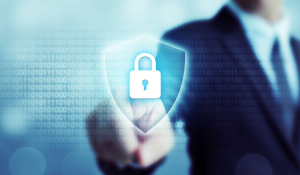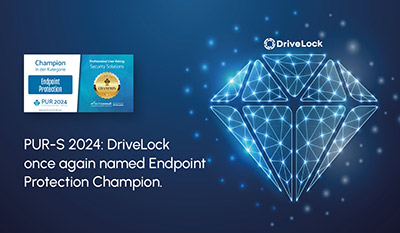How To Make Endpoint Security Easy And Effective
Managing endpoint security can feel like a constant uphill battle. Keeping up with the latest threats, ensuring all devices are patched and...
9 min read
 DriveLock
Aug 7, 2023 11:47:32 AM
DriveLock
Aug 7, 2023 11:47:32 AM

In the high-stakes environments of modern manufacturing and healthcare, a single compromised node can disrupt life-saving services or halt global production lines. As the line between IT and Operational Technology (OT) blurs, endpoint security has become the critical anchor for safeguarding national infrastructure.
And with the expansion of remote work and the Internet of Medical Things (IoMT), the surface area for potential breaches has never been larger. Effective endpoint security is the only way to gain visibility and control over this fragmented landscape.
From laptops and smartphones to servers and IoT devices, endpoints serve as the gateways to an organization's network, providing both access to valuable resources and a potential Achilles' heel for cyber attackers. In this blog post, we will dive deep into the world of endpoint security, exploring its importance, key components, and best practices for safeguarding your digital assets. Our guide will equip you with the knowledge and tools to secure your digital ecosystem effectively.
Endpoint security is a cybersecurity approach which refers to the protection and security measures applied to the individual devices (endpoints) connected to a network, such as laptops, desktops, tablets, or servers. These endpoints represent the last line of defense in a network, as they are the entry points for potential cyber threats and attacks. These threats can include malware, viruses, ransomware, phishing attacks, man-in-the-Middle, data breaches, and unauthorized access.
Endpoint security is a critical aspect of overall cybersecurity because endpoints are often the entry points for cyberattacks. With the increasing number of devices connected to corporate networks and the internet, securing these endpoints has become a crucial focus for organizations and individuals alike.
In cybersecurity, an endpoint refers to any computing device or peripheral that is connected to a network and has the capability to communicate and exchange data with other devices or systems. Endpoints can be physical devices, and other networked devices. They can also be virtual machines or cloud-based instances running on remote servers. So, which devices are considered endpoints?
Laptops, tablets,, desktop computers,
Internet of Things (IoT) devices,
Digital printers, scanners.
Healthcare: networked medical devices such as MRI scanners, infusion pumps and digital patient monitors are among the critical endpoints.
Manufacturing industry (smart factory): PLCs (programmable logic controllers), industrial robots and networked sensors in the production line.
Critical infrastructure sector (energy & water): smart meters, remote control devices in substations and control systems in waterworks are essential endpoints.
To address the security risks associated with endpoints, organizations implement various security measures, including endpoint security solutions (as explained in the previous response), access controls, encryption, multi-factor authentication, network segmentation, and continuous monitoring.
The API (Application Programming Interface) is the overarching set of rules and the interface that determines how two software systems interact with each other. An endpoint, on the other hand, is the specific address or physical location where this interaction actually takes place. Let's take a practical example of a payment service provider such as Stripe or PayPal:
The API: This is the entire product package. It includes the documentation, authentication protocols and all the functions an online shop needs to process payments. It forms the framework for secure data exchange.
The endpoint: This is the specific URL to which a command is sent. If your shop wants to authorise a payment, it sends a request to the endpoint https://api.dienstleister.com/v1/payments. Another endpoint would be responsible for querying refunds (/v1/refunds).
A clear example of endpoint security is the protection of a laptop in a home office, which is secured by a modern EDR solution (Endpoint Detection and Response). Imagine an employee receives a deceptively genuine phishing email and accidentally downloads an infected file attachment. This is when endpoint security kicks in: instead of just rigidly searching for known viruses, the software recognises the unusual behaviour of the file – such as attempting to change system settings or encrypt data.
The solution immediately blocks the process, isolates the laptop from the rest of the company network to prevent lateral movement, and simultaneously informs the IT team. Thanks to the protection of the individual endpoint, a potentially fatal ransomware attack has no consequences for the entire company.
Endpoint security plays a vital role in bolstering a company's comprehensive cybersecurity approach and safeguarding it against the diverse threats prevalent in the digital landscape. As a result, it holds immense significance for organizations and their overall cyber defense. Read 7 key points why endpoint protection is important for companies.
Attack vector: Endpoints are often the first attack vector for cybercriminals. Malware such as viruses, ransomware, Trojans and phishing attacks are often introduced via infected emails, malicious downloads or other vulnerabilities on endpoints. If endpoints are not adequately protected, attackers can easily gain access to corporate networks and data.
Decentralised work environments: With the increasing popularity of remote work and mobile devices, organisations need to manage and protect a larger number of endpoints. This significantly increases the risk of security breaches as many employees work outside the physical corporate infrastructure.
Data security: Endpoints often contain sensitive corporate data. If an endpoint is stolen or lost, confidential information can fall into the wrong hands. Endpoint Security provides encryption and protection of this data to prevent loss and data leakage.
Compliance requirements: Many industries are subject to certain privacy and security regulations. Inadequate endpoint security can cause companies to violate these regulations, which can result in legal consequences and large fines.
Network integrity: Protected endpoints help ensure the integrity of the entire corporate network. If one endpoint is compromised, there is a risk that the attack could spread to the entire network and affect other resources.
Damage to reputation: Cyber-attacks and data leaks can seriously affect customers' and partners' trust in a company. However, a good reputation is crucial to the success of a business and its long-term existence.
Time and cost savings: By deploying effective endpoint security, businesses can save time and money by spending less time remediating security incidents and reducing the likelihood of costly data loss or downtime.
Without robust endpoint security, companies expose themselves to a wide range of cyber threats that can compromise sensitive data, disrupt operations, and damage their reputation.
Although both technologies serve to protect digital assets, Endpoint Security and firewalls operate at fundamentally different layers of the network. Understanding their respective responsibilities is crucial for developing a comprehensive and multi-layered security strategy. For critical organizations, it's essential to know the functions of both components to avoid leaving security gaps in the overall concept.
The firewall forms the first line of defense and typically operates at the network perimeter or internal segment boundaries to filter all inbound and outbound traffic and block unauthorized connections. In contrast, Endpoint Security focuses directly on the endpoint device itself—the laptop, server, smartphone, or IoT device—where the actual data processing takes place and where most attacks originate. While the firewall controls the flow of traffic, Endpoint Security protects the device from malware, zero-day exploits, and fileless attacks, even if it is already inside the network or offline.
|
Feature |
Endpoint Security |
Firewall (Hardware/Software) |
|
Primary Focus |
Protection of the individual endpoint device (host) and the data and applications running on it. |
Control of network traffic (data packets) between networks or segments. |
|
Protection Layer |
Host-based (Layer 7 / Operating System). |
Network-based (Layer 3/4, NGFW also Layer 7). |
|
Threats Detected |
Malware, Ransomware, fileless attacks, Zero-Day Exploits, system manipulations. |
Unauthorized connections, port scanning, DDoS attacks, blocking of IP addresses and protocols. |
|
Location of Protection |
Directly on the endpoint device (even offline/remote work). |
At the network perimeter or between network segments. |
|
Components |
EDR (Detection & Response), Antivirus/Anti-Malware, Host IPS, Disk Encryption. |
Packet Filter, Stateful Inspection, NAT, VPN Gateway, Intrusion Prevention System (IPS). |
Endpoint security in companies works by deploying a combination of software tools, policies, and practices to protect the various endpoints (devices) connected to the organization's network.

Endpoint Security Solutions Deployment: Companies install specialized endpoint security software on individual devices like laptops, desktops, servers, and mobile devices. These security solutions are designed to detect, prevent, and respond to various cyber threats.
Antivirus and Anti-Malware Protection: Endpoint security software includes antivirus and anti-malware components that scan files, programs, and data on endpoints to identify and remove malicious software such as viruses, Trojans, ransomware, and spyware.
Firewall Protection: A firewall is often integrated into the endpoint security suite, which monitors incoming and outgoing network traffic. It enforces predefined rules to block potentially harmful or unauthorized communication attempts.
Data Encryption: Endpoint security solutions may offer data encryption features to safeguard sensitive information on endpoints. Encryption ensures that even if the device is compromised, the data remains unreadable without the proper decryption keys.
Patch Management: Companies ensure that the operating systems and software on endpoints are up-to-date by regularly applying security patches. This helps fix known vulnerabilities that could be exploited by attackers.
Device Control: Endpoint security allows organizations to control the use of peripheral devices such as USB drives, printers, and external storage to prevent data leakage or potential threats from infected devices.
Behavioral Analysis: Advanced endpoint security solutions employ behavioral analysis techniques to identify anomalous behavior on endpoints. This approach helps detect previously unknown threats that may evade traditional signature-based defenses.
Intrusion Detection and Prevention: Endpoint security tools continuously monitor endpoint activities for signs of potential intrusions or attacks. If suspicious behavior is detected, appropriate measures are taken to prevent further compromise.
Endpoint Detection and Response (EDR): EDR solutions provide real-time monitoring and response capabilities. They help organizations identify and respond to security incidents swiftly and effectively.
Mobile Device Management (MDM): For mobile endpoints, MDM solutions are employed to enforce security policies, manage devices remotely, and ensure compliance with security standards.
User Education and Training: Companies conduct regular cybersecurity awareness training for employees to promote safe computing practices and reduce the risk of human error-based security breaches.
Endpoint security can be utilized across various areas and devices within a company's network infrastructure. It is commonly deployed on employee workstations, laptops, and mobile devices to protect against malware and viruses. Critical servers and cloud-based instances also benefit from endpoint security measures to ensure data integrity and prevent unauthorized access.
On-location: An on-premise approach uses a locally hosted data centre as the hub for the management console. This accesses the endpoints via an agent to ensure security. This approach is considered an outdated model and has disadvantages, such as creating security silos, as administrators can usually only manage endpoints within their domain.
Hybrid: A hybrid approach combines both on-premise and cloud solutions. This approach has become increasingly popular since the pandemic led to increased remote working. Companies have adapted their legacy architecture and adapted elements of it for the cloud in order to retain some cloud capabilities.
Cloud: Allows administrators to monitor and manage endpoints through a central management console in the cloud, to which devices connect remotely. Cloud solutions take advantage of the cloud to provide security behind the traditional perimeter, eliminating silos and increasing administrator reach.
Running endpoint security in the cloud offers a host of advantages that not only streamline operations but also enhance overall protection. From simplifying management to reducing costs, cloud-based endpoint security has become a strategic choice for businesses looking to safeguard their network and data. Here are five key benefits of adopting a cloud-based approach to endpoint security.
Simple and fast
The cloud migration process begins with a fully guided configuration. We will lead you through each step, enabling you to quickly set up and launch the application. Predefined security profiles are already in place, which you can tailor to your precise requirements.
Saves resources
Cloud provisioning operates on a subscription model, where costs are tied to the number of endpoints. Moreover, you become independent of infrastructure and networks, eliminating data center expenses and hardware/software maintenance costs. DriveLock’s security experts handle the regular updates and adapt the solution portfolio to combat the latest cyber threats, resulting in cost savings and reduced workload for your IT department.
Less effort plus experienced security experts
DriveLock takes charge of application management, reducing your effort while benefiting from the support of security experts. We offer a fully managed service, where our skilled professionals handle the hosting of the entire solution on your behalf.
Up-to-date security fixes
Our primary focus is on security. In the cloud, bugs are swiftly addressed, and new features are promptly updated, all provided to you without any additional charges. Additionally, the cloud offers reduced downtime, seamless failover, and enhanced scalability, making it a highly advantageous option.
No additional for updates
Application upgrades are seamlessly integrated and do not demand separate installations or extra time. We deliver expert support and tailor a cost plan based on your subscription model for a personalized experience.
Many security leaders in high-stakes sectors like healthcare and manufacturing are asking: what is the future of endpoint security? The answer lies in a fundamental shift from reactive protection to autonomous resilience. For critical enterprises, the perimeter has not just dissolved—it has been replaced by a dynamic, identity-centric ecosystem where "Agentic AI" takes the lead. Rather than simply alerting a human analyst, future-ready endpoint security solutions are evolving to reason, plan, and execute self-healing protocols in real-time.
In manufacturing, this means the seamless convergence of IT and OT (Operational Technology), where security extends from the corporate laptop down to the factory floor’s industrial sensors. In healthcare, it involves "Quantum-safe" encryption and continuous behavioral authentication to protect the Internet of Medical Things (IoMT) without disrupting clinical workflows. Ultimately, the future is an environment where endpoints are not just defended, but are inherently capable of neutralizing sophisticated, AI-driven threats before they can impact production lines or patient care.
Endpoint security is not just an option; it's an absolute necessity in today's interconnected and threat-filled digital world. As cyber threats become increasingly sophisticated and relentless, protecting your organization's endpoints has become a top priority. By implementing a robust endpoint security strategy, you can safeguard your data, systems, and reputation, while also ensuring the productivity and peace of mind of your workforce.
Strengthen your cybersecurity with our endpoint security and endpoint protection solutions based on the Zero Trust model. You can try them free of charge and without obligation for 30 days. Sign up for a free trial below!

Managing endpoint security can feel like a constant uphill battle. Keeping up with the latest threats, ensuring all devices are patched and...

The shift toward interconnected digital environments has increased the surface area for potential data breaches, making encryption a vital tool for...

The manufacturer of products for IT and data security achieves top results in user surveys for the third time.